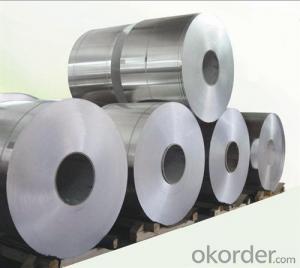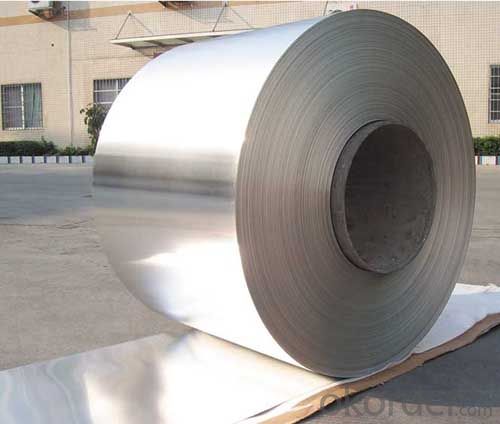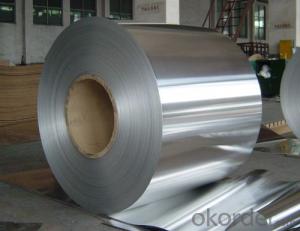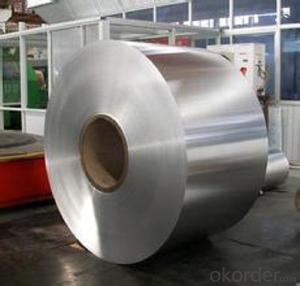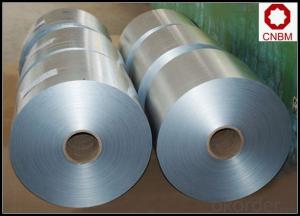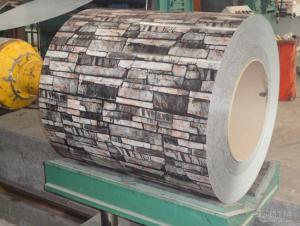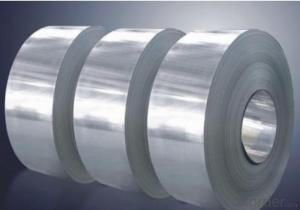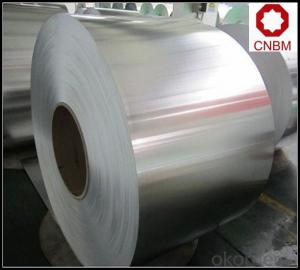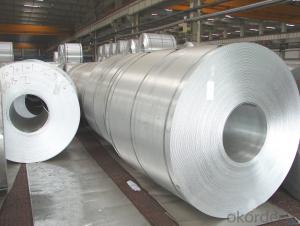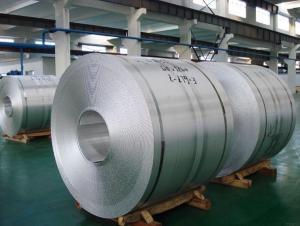Coated Continuous Casting Cold Aluminum Coil 1/3 Series
- Loading Port:
- China main port
- Payment Terms:
- TT OR LC
- Min Order Qty:
- 5 m.t
- Supply Capability:
- 10000 m.t/month
OKorder Service Pledge
OKorder Financial Service
You Might Also Like
Specification
1. Specification of Continuous Casting Cold Aluminium Coil 1/3 Series
Alloy: 1050, 1060, 1100, 3003, 3004, 3005, 3105
2) Temper: Various status
3) Thickness: 0.15-5mm
4) Width: 300-1950mm
5) Length: Under9500mm/ Coil
6) Weight: 1-8 tons per coil
7) Dimensions and weight can be produced according to clients' specifications.
8) Inner Diameter: 505mm, 605mm
9) Packing: Export standard, wooden pallet.
10) Delivery time: 20 days
11) Minimum order quantity: 5 tons per size.
12) The term of payment: T/T, irrevocable L/C at sight.
13) Surface: Bright
14)Origin: China
2. Application of Continuous Casting Cold Aluminium Coil 1/3 Series
(1).Interior: wall cladding, ceilings, bathrooms, kitchens and balconies, shutters, doors...
(2).Exterior: wall cladding, facades, roofing, canopies, tunnels,column covers , renovations...
(3).Advertisement: display platforms, signboards, fascia, shop fronts...
3. Feature of Continuous Casting Cold Aluminium Coil 1/3 Series
*Such coil is specially designed to replace aluminum ingot, due to the high export tax of aluminum ingot, the coil has better price than ingot.
*This type of coil can fit customer's remelting furnace just like ingot, no need to make any change to the production line that was previously used for ingot. The standard coil size and weight is very suitable for the feed gate of furnace.
*This type of coil causes less material wastage than ingot when remelted.
*Our coil is made directly from ore, no need to go though the ingot making process, quality is much better than other suppliers who use ingot scrap to make coil.
Be free from Oil Stain, Dent, Inclusion, Scratches, Stain, Oxide Dicoloration, Breaks, Corrosion, Roll Marks, Dirt Streaks and other defect which will interfere with use
4. Certificate:
SGS and ROHS(if client request, paid by client), MTC(plant provided), Certificate of Origin(FORM A, FORM E, CO), Bureau Veritas and SGS (if client request, paid by client), CIQS certificate
5. Image of Continuous Casting Cold Aluminium Coil 1/3 Series
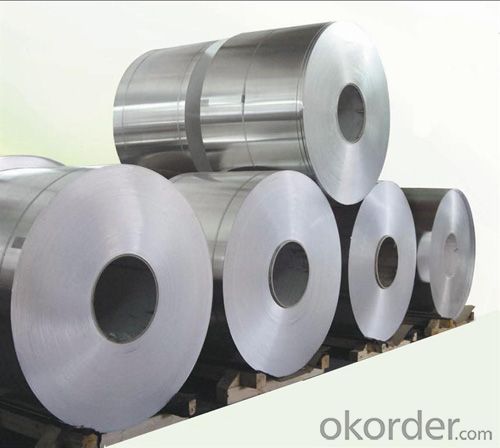
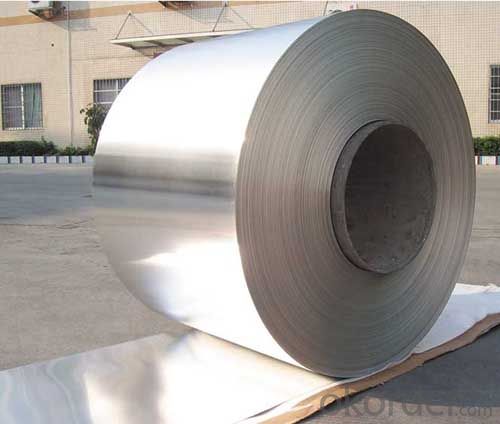
6. Package and shipping of Continuous Casting Cold Aluminium Coil 1/3 Series
eye to sky
eye to wall
with wooden pallet (wooden case also available)
7. FAQ
1) What is the delivery time?
Dpends on actual order, around 20 to 35 days
2) What is the QC system:
We have QC staff of 20 persons and advanced equipment, each production is with MTC traced from Aluminum ingot lot.
3) What market do you mainly sell to?
Australia, America, Asia, Middle East, Western Europe, Africa etc
- Q: Can aluminum coils be used for signage purposes?
- Yes, aluminum coils can be used for signage purposes. Aluminum is a versatile and lightweight material that is commonly used in the signage industry. It has excellent corrosion resistance, making it suitable for both indoor and outdoor applications. Aluminum coils can be easily cut and formed into various shapes and sizes, allowing for customizable signage designs. Additionally, aluminum is highly durable and can withstand harsh weather conditions, making it a long-lasting option for signage. The coils can be painted or coated with different finishes to achieve the desired aesthetic appeal, while also providing protection against fading and scratching. Overall, aluminum coils are a popular choice for signage purposes due to their versatility, durability, and aesthetic appeal.
- Q: What are the different coil packaging sizes available for aluminum coils?
- The packaging sizes available for aluminum coils can vary depending on the specific needs and requirements of the customer. However, there are generally standard coil packaging sizes that are commonly available in the market. These sizes typically range from small to large, with varying dimensions and weights. Some of the common coil packaging sizes for aluminum coils include: 1. Small coils: These are typically used for smaller applications or projects. They usually have a diameter of around 200-300mm and a weight of approximately 50-150kg. 2. Medium coils: These coils are suitable for medium-sized applications and projects. They typically have a diameter of around 300-600mm and a weight of approximately 150-500kg. 3. Large coils: These coils are designed for larger applications or projects that require a greater amount of aluminum. They usually have a diameter of around 600-1200mm and a weight of approximately 500-2000kg. It's important to note that these are just general guidelines and the actual coil packaging sizes may vary depending on the manufacturer and specific requirements of the customer. Additionally, custom packaging sizes can often be requested to meet unique project needs.
- Q: What are the different tensile strengths of aluminum coils?
- The tensile strength of aluminum coils can vary depending on the specific alloy and temper of the aluminum used. Aluminum alloys commonly used for coils include 1100, 3003, 5052, and 6061. The tensile strength of these alloys can range from approximately 13,000 psi (90 MPa) for 1100 aluminum to around 45,000 psi (310 MPa) for 6061 aluminum. The temper of the aluminum also plays a significant role in determining its tensile strength. The most common temper for aluminum coils is H14, which means the material has been strain-hardened and partially annealed to achieve a balance of strength and formability. Other tempers such as H18, H24, and H32 can result in higher tensile strengths, whereas softer tempers like O (annealed) or H12 can have lower tensile strengths. It is important to note that these values are general ranges and can vary slightly depending on the specific manufacturer and production process. Additionally, factors such as thickness, width, and surface treatment of the aluminum coils can also influence their tensile strength. Therefore, it is recommended to consult the manufacturer's specifications or test the specific aluminum coil to accurately determine its tensile strength.
- Q: This question asks for methods to assess the quality of aluminum coils, which is important for various industries that use aluminum for manufacturing and construction.
- <p>To check the quality of aluminum coils, you should inspect for surface defects such as scratches, dents, or discoloration. Measure the thickness and width to ensure they meet specifications. Test the hardness and tensile strength to verify mechanical properties. Conduct a chemical analysis to confirm the alloy composition. Check for internal defects using non-destructive testing methods like ultrasonic testing. Assess the coil's flatness and straightness to prevent issues in further processing. Finally, ensure proper packaging and storage conditions to maintain coil quality.</p>
- Q: Can aluminum coils be used in the production of aluminum louvers?
- Yes, aluminum coils can be used in the production of aluminum louvers. Aluminum coils are typically used as a raw material in various manufacturing processes, including the production of aluminum louvers. They can be easily formed and shaped into the desired louver design, offering durability and corrosion resistance.
- Q: What are the weight ranges of aluminum coils?
- The weight ranges of aluminum coils vary depending on their size and thickness. Generally, aluminum coils can range anywhere from a few hundred pounds to several thousand pounds. Smaller coils, typically used for household purposes or in manufacturing small parts, can weigh around 100-500 pounds. Medium-sized coils, commonly used in construction or automotive industries, can range from 500-2,000 pounds. Larger coils, which are commonly used in heavy-duty applications such as aerospace or marine industries, can weigh over 2,000 pounds and sometimes exceed 10,000 pounds. It is important to note that these weight ranges are approximate and can vary based on the specific requirements of a particular project or application.
- Q: What is the coefficient of thermal expansion of aluminum coils?
- The coefficient of thermal expansion of aluminum coils is typically around 23 x 10^-6 per degree Celsius.
- Q: I'm 14 an was told that aluminum free deodorant would stop yellow stains on my white shirts, so which female deodorant would help stop yellow stains
- Aluminum salts are used in antiperspirants. So, skip anything that claims to be an antiperspirant. (Some things that are antiperspirants are sold as deodorants, but not the other way around.) Right Guard Sport spray does not contain aluminum salts, and my T-shirts stayed white after I switched to it. Many people mistakenly think that it is the sweat that discolors the armpits.
- Q: Today at my school I was messing with this sketch thingy, the one with 2 knobs to twist up or down to draw, my friend decided to break it and when we broke it, this silver dust called aluminum powder got on my hands, I never knew it was dangerous cause your see, we never read the manual we just found it. About 3 minutes later he pointed to my hand and I saw blood. It kinda stung.
- The aluminum powder found in an Etch-a-Sketch will not cut you, it's much too small. In fact it's so small you could only see it's edges under a high powered microscope. The cut was most likely caused by jagged glass/plastic when you broke the Etch-a-Sketch open. It's not unusual to cut yourself and not realize until someone else sees you're bleeding.
- Q: This question asks for the distinctions between aluminum coil and steel coil, focusing on their properties and uses.
- <p>Aluminum coil and steel coil differ in several aspects. Aluminum coil is lightweight, corrosion-resistant, and has good thermal conductivity, making it ideal for applications requiring flexibility and resistance to weathering. It's commonly used in construction, packaging, and electrical applications. Steel coil, on the other hand, is stronger and more durable, suitable for heavy-duty applications. It's often used in automotive, construction, and manufacturing due to its high strength and ability to withstand heavy loads. Steel is also magnetic, which is a property not shared by aluminum. The choice between aluminum and steel coil depends on the specific requirements of the project, such as weight, strength, and environmental resistance.</p>
Send your message to us
Coated Continuous Casting Cold Aluminum Coil 1/3 Series
- Loading Port:
- China main port
- Payment Terms:
- TT OR LC
- Min Order Qty:
- 5 m.t
- Supply Capability:
- 10000 m.t/month
OKorder Service Pledge
OKorder Financial Service
Similar products
Hot products
Hot Searches
Related keywords
